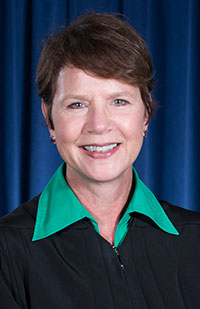Seamless Transition: Ohio's Initiative for Military Spouse Attorneys

Ohio Supreme Court Chief Justice Sharon L. Kennedy

Ohio Supreme Court Chief Justice Sharon L. Kennedy
As we approach Veterans Day, a time to honor and recognize the sacrifices of our service members, it's crucial to remember that support for the military extends beyond the battlefield and into the homes of those who serve. Military families face unique challenges, and among them are military spouses who strive to maintain their professional careers amidst frequent relocations.
Imagine dedicating your life to serving others through the law, only to face hurdles every few years due to your spouse’s military service. This is the reality for many military spouse attorneys.
These obstacles can seem insurmountable because the regulation of the legal profession is on a state-by-state basis, meaning that under certain conditions, an attorney who moves to a new state would be required to take the grueling, multi-day bar exam all over again.
Retaking the bar exam is out of the question for some parents. If there are children in the family, the non-military spouse has the responsibility of raising them, while often working at least part-time to make ends meet. That leaves little time for studying for the bar exam.
These licensing requirements often lead to career interruptions and financial instability.
The Supreme Court of Ohio has amended its rules of practice to alleviate these challenges, allowing military spouses to seamlessly continue their legal careers when stationed in our state. All a relocating attorney has to do is apply to the Supreme Court of Ohio with proof that they passed the bar exam in another state, and they will be granted a temporary admission to practice law in Ohio. The entire process can take as little as three months.
An attorney with less than a five-year history as a practicing lawyer will be given a temporary license to immediately begin work in Ohio. If an applicant has worked as an attorney for five out of the last ten years, they will be allowed to bypass the bar exam.
The military spouse waiver made a real difference for Nicole Grassel, whose husband is a pilot assigned to the 180th Fighter Wing in Swanton, Ohio. She worked as an assistant prosecutor in New Mexico before moving to the Toledo area. The waiver allowed her to take a similar position in the prosecutor’s office for Lucas County.
Marcie Sherman practiced law in Colorado for only two years before her military spouse was transferred to Nevada, a state without an exemption for spouses. It took her four years to successfully prepare for the Nevada bar exam. It was a far different story when her Air Force spouse transferred to Ohio and now Sherman works at the Montgomery County Public Defender’s Office.
The Supreme Court of Ohio’s initiative is a beacon of support, providing military spouses a fair chance to continue their careers without unnecessary barriers.
If you or someone you know is a military spouse attorney facing these challenges, visit the Supreme Court’s website or contact the Office of Bar Admissions to learn more about this pivotal program.
Together, let’s ensure that the sacrifices made by military families do not include sacrificing the financial stability of their families, their professional aspirations, and service to their communities.


